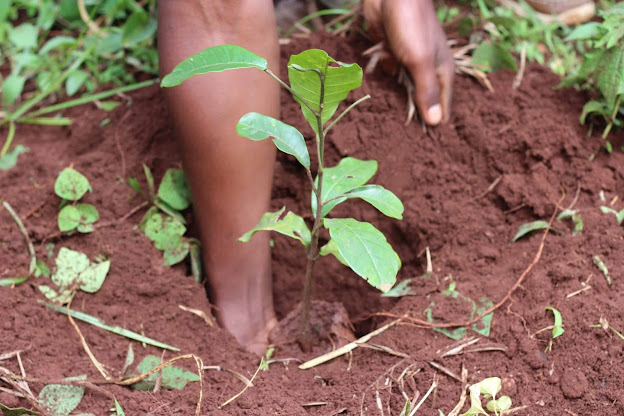By
ANNIE ZULU
Amidst
the challenges posed by the El
Niño- induced drought which
has affected 9. 8 million people across Zambia, a community- led
initiative to preserve trees and restore those that have been lost has emerged
in Kamilambo Village, Chief Kaindu´s area in Mumbwa district.
Situated
about 140km from the Zambia´s Capital City Lusaka, Mumbwa district is one of
the drought-stricken
areas and has been a hotspot
for tree cutting and charcoal production over the years.
The
district is now grappling with the impact of the drought, which has
posed significant threats to agricultural productivity and livelihoods. The
drought has exacerbated existing vulnerabilities, particularly for communities
reliant on traditional farming practices.
In
April, the Zambian government banned charcoal production permits in Mumbwa, Itezhi-tezhi and Shibuyunji
districts in an effort to address the escalating climate crisis and
curb deforestation.
The
ban prohibits the issuance of Cord Wood Permits for charcoal production in the
designated districts. Stricter enforcement measures, including enhanced patrols
and penalties for non-compliance, are being implemented to ensure adherence to
the directive.
According
to then Minister of Green Economy and Environment Engineer Collins
Nzovu, his Ministry had recorded increased levels of deforestation
and land degradation due to illegal and massive cutting down of trees for
charcoal production, in the three districts.
It takes a community
The
traditional leadership and community members of Kamilambo Village in
Mumbwa have since taken a proactive stance towards climate change
and forest preservation in the area.
The
community has recognised the detrimental
impacts of massive tree cutting, particularly for charcoal production on the
local environment and the severe drought affecting the country and has
mobilized to implement effective measures.
Senior Village Headman Moses Mulamfu ,78, told this reporter
that the community has established a customary law that punishes individuals
found cutting trees, stressing the community's commitment to preserving their
natural resources.
“Cutting down of trees is
now a very serious offense in this chiefdom and if anyone is found doing it, we
charge them with goats according to how many trees they have cut,” Headman
Chama said.
He added that the law
has proved to be effective, as there has been a reduction in charcoal burning
activities in the area and for three people have seen charged so far.
“Charcoal kilns were
everywhere, but we no longer see that anymore, because we have come together as
a community to try and put this to an end,” he explained.
The Community has also taken a
proactive approach to diversifying local economies and reducing dependency on
charcoal production by promoting alternative livelihood activities such as
beekeeping, organic tomato growing, and poultry among others.
Another Senior Headman, Lawrence Kabalakasha ,56, said the
community is not only aiming to address environmental concerns but also create
sustainable income-generating opportunities.
However, Headman Kabalakasha, appealed to the government and other stakeholders for
support for the success
and scalability of these alternative livelihood programs.
“Support in terms of funding, training, and infrastructure development, can help strengthen these initiatives and ensure their long-term sustainability,” he said.
From An Ex-Charcoal Burner's Perspective
Oliver Sondashi
,34, is one of the youths in Kamilambo village involved in the charcoal
burning business five years ago and cut down hundreds of trees yearly in the
area.
Oliver,
who is now an advocate for climate change and one of the frontliners of the
community-led initiative, decided to abandon the charcoal business
after realising he wasn´t making enough money from it to feed his family
and the effects it had on his health.
“I
was in the business for five years and I never made good profit,
the people who benefit more were those that bought charcoal from us to go
and resale in the city. I was also constantly experiencing serious chest
pains,” he said.
As an
advocate for climate change, Oliver plays a crucial role in raising awareness
and mobilizing his community to address environmental issues.
“Trees play a critical role in mitigating climate change because they have the ability to absorb and store carbon emissions. Most people in this community including children are now aware of the effects of cutting trees because we have community meetings where we discuss these things, we also do door-to-door campaigns and target schools,” he said.
Women Taking the Lead
The women in Kamilambo village are also actively
participating in shaping the future of their community as far as ending
deforestation is concerned and Jacqueline Chiyema ,40, is among them.
Jacqueline who has lived her entire life in the Village is
leading tree plantation across the community.
According to her, charcoal burning has done more harm than
good to the community, pointing out the decline in biodiversity, evidenced by
the disappearance of birds, butterflies and other animals.
“Nowadays, we don’t see birds, butterflies and many other
animals like back in the days. We don’t also get to have wild fruits because
most of the trees have been cut, we need to restore the trees,” she said.
She observed the urgent need restoration of the local
environment and the importance of preserving it for future generations.
“Restoring trees will not only help to mitigate climate
change but also promote ecosystem health and resilience, providing essential
recourses for both wildlife and our community," she said.
Another woman Eunice Mulamfu ,53, noted the exploitation of
children in charcoal burning, saying it does not only deprive them of their right to education but
also exposes them to hazardous working conditions and undermines their overall
well-being.
Eunice, called for a permanent end to charcoal burning
in the village, as this will protect children in the community and the promotion of their
access to education and a safe environment.
These
narratives paint a picture of resilience, collaboration and determination in
the face of climate change challenges. By harnessing community-driven solutions
and support, initiatives like those in Kamilambo village offer hope for a more
sustainable future in Zambia and beyond.





No comments:
Post a Comment